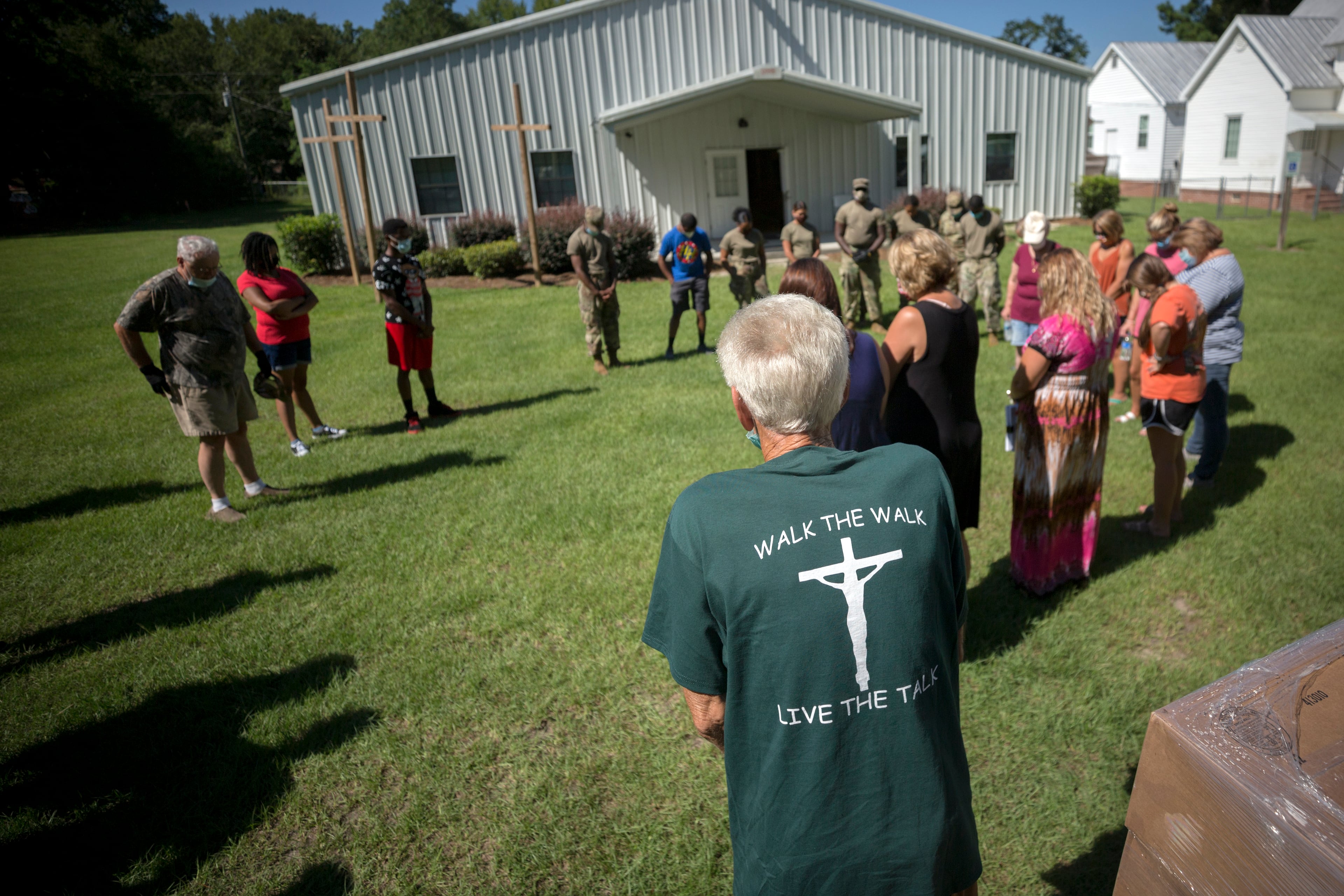Across rural Georgia, pandemic magnifies challenges of hunger, food

SUMMERTOWN, Ga. — Eleanor Hayslip began her routine of going car to car, greeting the people who needed her.
At the mid-July food drive Hayslip helped organize, the temperature reached 90 degrees before 10 a.m. and the long line of cars took up half of two-lane Church Street. But in this town of 180, three hours southeast of Atlanta in Emanuel County, the extra traffic wasn’t too much of a problem.
“Well hey, ladybug! How are you doing today?” Hayslip said, spotting someone she knew in line. “Just pull on up, sweetheart.”
After a group prayer outside the local Baptist church, National Guard members and local volunteers spent the morning loading up nearly 200 cars with eggs, bread and other essentials. It’s a scene that has played out on country roads across rural Georgia, where — even before the coronavirus pandemic began — food insecurity rates were worse than in more densely populated areas.

Now, experts believe that as the virus shut down commerce, closed some factories and forced many to stay home, residents in rural pockets of the state remain more likely to face hunger than city-dwellers. In many ways, Emanuel County represents the struggle rural communities across South and Middle Georgia face over hunger, and how local groups are fighting to continue feeding their neighbors.
About 18% of Emanuel’s 22,600 residents experienced food insecurity before the pandemic hit, compared to 12.5% in Fulton County, according to Feeding America, a national nonprofit with a network of more than 200 food banks. During the pandemic, the food insecurity rate in Emanuel could reach 23%, Feeding America estimated.
The pandemic has put a strain on small, community-based food pantries, like the one in Summertown, which many families rely on to get through the month. Of the 175 agencies that partner with the Augusta-based Golden Harvest Food Bank, about one-third have suspended operations during the pandemic due to safety concerns, said Executive Director Amy Breitmann. That has led Golden Harvest and other food banks to ramp up efforts to bring truckloads of food to rural communities on a more regular basis during the pandemic.
“As you can imagine, the rural areas struggle on an average day,” Breitmann said. “They already have the challenge of not having as many pantries.”

‘We all know each other around here’
Hayslip started the Summertown Food Pantry 11 years ago with money she and other church members raised from yard sales. Moved by “seeing the need” in their own community, Hayslip said, they began in a small aluminum building next to the church.
Now, people from around Emanuel County and the surrounding rural areas come to the pantry’s distribution events, which typically happen twice a month. Much of the food at the pantry comes from Golden Harvest, which buys some food and receives donations from grocery stores, farmers and the federal government, servicing 25 counties in eastern Georgia and South Carolina.
The lines have grown since the coronavirus pandemic began, Hayslip said. Many come from nearby cities that don’t have a pantry of their own.

“By the time I get through with my bills, I’ve got nothing left for food,” said Steve Perkins, 35, waiting in line at the Summertown food drive. Perkins, who lives over 10 miles away in Swainsboro, makes money cutting grass, but business has been slow since the pandemic hit. He said his family receives a Social Security check each month, and “it’s barely enough to cover the bills.”
A few cars up, 64-year-old Barbara Breedlove picked up food for herself and a family she helps provide for.
“This is truly helping me, and it’s helping whole lot of people,” she said.
Breedlove is retired and only leaves her house for food, medicine and doctor’s visits.
“Thank God pride is not in the way, because a lot of people are too proud to come out and get help when they need help,” she said. “If you need help, help is here. Many people don’t have food in their houses.”

As Hayslip puts it, Summertown is the type of small city where “we all know each other around here.” The town has one food mart and a restaurant that only opens on the weekends, across the street from a town welcome sign that advertises Summertown as “A Great Little Community.”
But that can make it difficult for some to wait in a line for food if they’re worried about the stigma that is sometimes associated with it. During the recent food drive in Summertown, several volunteers cheerfully greeted people they recognized who were picking up food.
“It takes a lot to stand in a food line,” Hayslip said. But her mantra is that people visiting the pantry don’t just represent a box of food — “they’re family.”
Challenged by location, income
Experts say food insecurity is more severe in rural Georgia because of the high poverty rates in the region and reduced access to fresh, affordable food. Many in rural Georgia are also older and live on a fixed income.
About 27% of people in Emanuel County live in poverty, nearly double the statewide poverty rate, according to the U.S. Census Bureau. The median household income in Emanuel and several surrounding counties is under $40,000, compared to $58,000 for the state. An Atlanta Journal-Constitution analysis last year found that rural Georgians were more likely to receive Supplemental Nutrition Assistance Program benefits, commonly known as food stamps.
The coronavirus has only exacerbated worries over income as large swaths of the economy shut down earlier this year. Across rural Georgia, several factories had to close due to outbreaks of COVID-19. At the Summertown rally, volunteers rattled off a list of several local factories that had to temporarily close because of the virus; the industries range from food manufacturing to adhesives to vinyl windows.
Experts say residents in less dense areas of the state also have a harder time getting food, because they are less likely to live near a grocery store.
“We have rural areas across the country that have been in economic decline for a while,” making it harder for local grocers to open and stay in business, said Jerry Shannon, a University of Georgia professor who has studied “food deserts.” The U.S. Department of Agriculture defines rural food deserts as places that are low-income and more than 10 miles from a supermarket.

The USDA’s latest research shows several large chunks of rural Georgia, especially in eastern and South Georgia, qualify as food deserts. Summertown families have to drive more than 10 miles into Swainsboro to get groceries from Walmart or Harveys, a smaller supermarket chain.
Food banks have the additional challenge of bringing thousands of pounds of food to more isolated, rural areas. Not all of the small pantries have enough refrigerated storage, so Golden Harvest will sometimes send a refrigerated truck to help during a food drive.
During the pandemic, Golden Harvest has worked to increase the number of mobile food distribution events and fill some of the gaps left by pantries that have closed. It is also spending 30% more on food, though it has suspended its volunteer program at its Augusta headquarters.
“These are places that are already a challenge for us to reach,” said Breitmann, the food bank director. “It’s really a domino effect of things that are kind of against us in trying to serve more people.”



